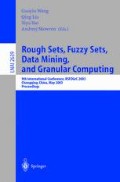Abstract
With the prevalence and explosive growth of distance education via the World Wide Web, many efforts are dedicated to make distance education more effective. We present a Rough Set model to provide an instrument for learner self-assessment when taking courses delivered via the World Wide Web. The Rough Set Based Inductive Learning Algorithm generates definite and probabilistic(general) rules, which are used to provide feedback to learners.
Access this chapter
Tax calculation will be finalised at checkout
Purchases are for personal use only
Preview
Unable to display preview. Download preview PDF.
References
Moore, M.G. & Thompson, M.M., with Quigley, A.B., Clark, G.C., & Go., G.G. (1990). The Effects of Distance Learning: A Summary of the Literature. Research Monograph No.
Sherry, L. (1996). Issues in Distance Learning. International Journal of Educational Telecommunications, 1(4), 337–365.
http://www.uidaho.edu/eo/distglan.html. January, 2002.
Y. Y. Yao, S. K. Wong and T. Y. Lin: A Review of Rough Set Models. In: T. Y. Lin, N. Cercone (eds.), Rough Sets and Data Mining: Analysis for Imprecise Data, Kluwer Academic Publishers, Bosten (1997) 47–75
A. H. Liang, B. Maguire, and J. Johnson. Rough Set Based WebCT Learning. In Proceedings of the 1st International Conference on Web-Age Information Management, Shanghai, P.R. China, June 21–23, 2000. Springer-Verlag LNCS 1846.
T. Mollestad and A. Skowron. A Rough Set Framework for Data Mining of Prepositional Default Rules. The 9th International Symposium on Methodologies for Intelligent Systems, ISMIS’96, Zakopane, Poland, June 9–13, 1996.
Z. Pawlak, Rough Set, International Journal of Computer and Information Sciences, 11, pp. 341–356, 1982.
Author information
Authors and Affiliations
Editor information
Editors and Affiliations
Rights and permissions
Copyright information
© 2003 Springer-Verlag Berlin Heidelberg
About this paper
Cite this paper
Geng, H., Maguire, B. (2003). A Rough Set Methodology to Support Learner Self-Assessment in Web-Based Distance Education. In: Wang, G., Liu, Q., Yao, Y., Skowron, A. (eds) Rough Sets, Fuzzy Sets, Data Mining, and Granular Computing. RSFDGrC 2003. Lecture Notes in Computer Science(), vol 2639. Springer, Berlin, Heidelberg. https://doi.org/10.1007/3-540-39205-X_42
Download citation
DOI: https://doi.org/10.1007/3-540-39205-X_42
Published:
Publisher Name: Springer, Berlin, Heidelberg
Print ISBN: 978-3-540-14040-5
Online ISBN: 978-3-540-39205-7
eBook Packages: Springer Book Archive

